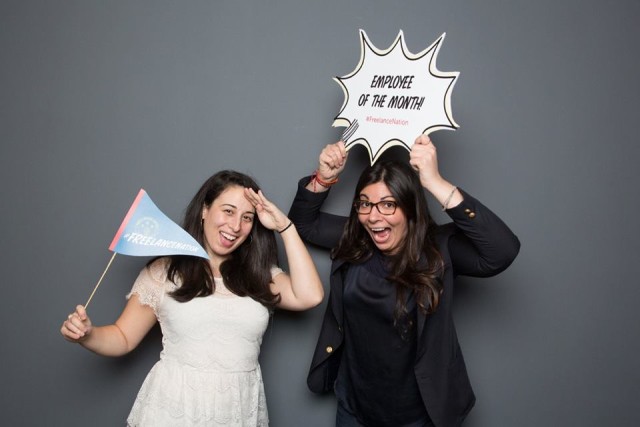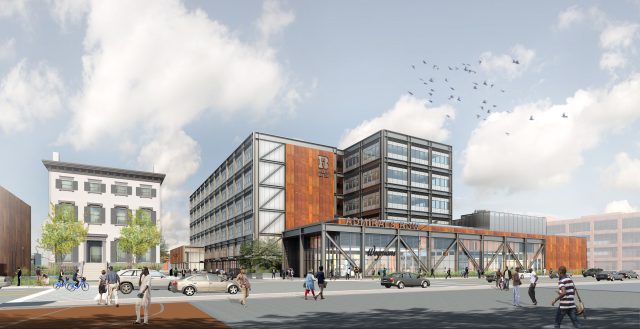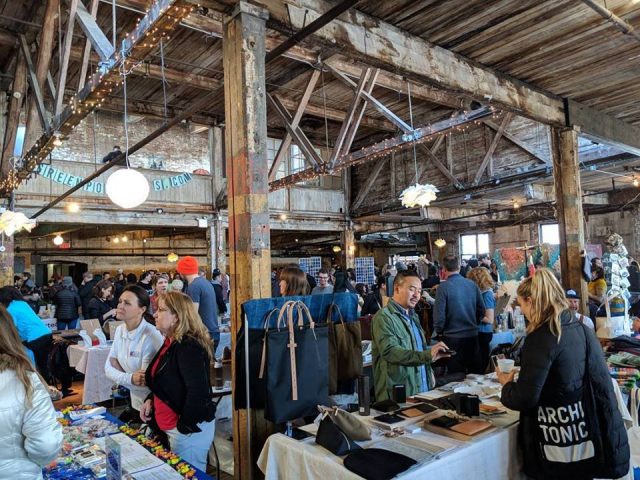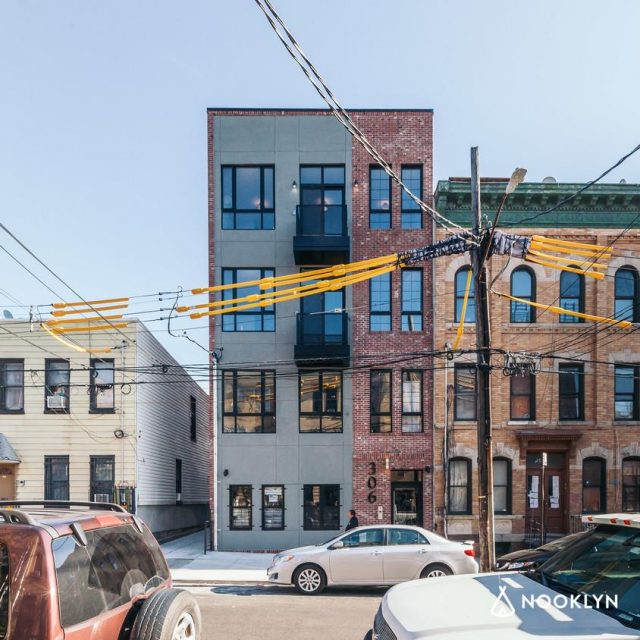
One voter segment you basically never hear anything about during this or any election — well, not counting anyone who doesn’t live in a swing state — is freelancers. This isn’t surprising, as most of the freelancers have long been considered the “other” of the economy, less politically neat to categorize than middle-class America, unworthy (mostly) of demonization like the 1 percent, confusing to politicians who only slide talking points down well-worn tracks in speeches that don’t take into account the new economy where everyone has a few jobs.
But the amount of freelancers in the economy is increasing every year, growing by two million people in the past two years alone, according to the Freelancers Union, and sure to grow larger as more of us lousy millennials get sick of the boring offices, dress codes and rigid working hours that made our parents so grumpy for so long.
Here in New York, we’re on particularly fertile ground for freelancers. It’s a broad category mostly united by the constant fretting about checks arriving in time — writers, filmmakers, musicians, accountants, designers, costume makers, financial advisers, nannies and more all fit in. Maybe your go-to image of freelancers is someone blogging in their pajamas or camping out in coffee shops all day, but the category is much broader and less homogenous. They’re also very politically minded: even a slight shift in the economy can mean work dries up and the checks stop coming. So maybe that’s why freelancers vote at a way higher rate than the general population. So with an eye on the future, and the growing freelancer voter base, a report out this week gave us a look at how freelancers are voting. So why don’t politicians pay attention?
For this info we turn to the Brooklyn-based Freelancers Union, which last week produced its third annual Freelancing in America report, which is basically like a state of the union for the people who have to worry about getting their own health insurance. The report says the freelance workforce grew to 55 million last year, making up 35 percent of the workforce. That’s slightly less than the number of people who live in California and New York combined.
“The days of the traditional nine-to-five job are long gone,” the report reads. “Freelancing is here to stay. As the economy shifts, our elected officials need to shift with it by supporting the independent workers and voters who are helping to move the economy forward.”
First, the juicy stuff: 45 percent of freelancers say they’re voting for Hillary, 33 percent said they’d vote for Tiny Butthole Mouth, 9 percent said they’d go for Gary Johnson and 12 percent were Ken-Boneheads (undecideds). No one in the freelance world apparently has any love for Jill Stein. Hillary at least has paid some lip service to freelancers’ No. 1 bete noire this election: deadbeat clients. Trump, as you know, is a deadbeat client.
When Hillary wins, all women on their first day of their periods will get the day off, paid, even if they're freelancers. #keepdreaming.
— Lisa Selin Davis (@LisaSelinDavis) September 13, 2016
So here’s why this is all important: 85 percent of freelancers are likely to vote in the election, which is greater than the overall population: the voter turnout is usually around 50-60 percent for a presidential race. Freelancers could account for 47 million voters, more than enough to sway a few electoral votes in November. Hey now that’s some electoral power!
The report goes on to some obvious conclusions, including that 68 percent of freelancers are more likely to vote for a candidate that supports freelancers’ interests, and that 70 percent say we need more discussion of how to empower the freelance workforce.
OK so, what actually falls under “freelancers interests?” It’s not ISIS or TPP or refuges or building wall between us and Mexico or bringing manufacturing jobs back to America, because no one is dying to give up the job they can do from a MacBook for one in a factory.
I did an informal, unscientific study of some freelancers in New York and elsewhere to see what they cared about most: The No. 1 issue was health care, that basic human thing that seems impossibly expensive when you’re on your own.
“Keep reforming, keep baby stepping to a single-payer system,” one designer in Brooklyn said. The idea of care in general is needed across the board, in fact.
“As a freelancing stay at home mom, the issue of affordable childcare is important, especially Pre-K programs,” one friend in South Carolina said. She added: “Or the free distribution of iPads so kids stay busy while parents work from home, that would be fine too.”
I think freelancers and the self employed understand Hillary’s plowing thru illness better than those with sick days.
— Glenn Fleishman (@GlennF) September 12, 2016
We all have debt, and when you’re barely squeaking by on freelance jobs, the mountain of debt starts to look like an unclimbable distant feature of the horizon, pointless to even attempt scaling.
One art director and designer in Portland told me: “[It’s] more about student debt for me, really. Freelancing wouldn’t feel so fragile to me if I didn’t have to worry about the burden of having to pay for college.”
A project manager in the arts who lives in Brooklyn said that Hillary has her vote because she “has laid out a plan that mostly helps students borrow better and paves the way to more loan forgiveness programs.”
freelancers rejoice! Someone like Trump may one day screw you over too!
— Sonia Weiser (@weischoice) September 27, 2016
Personally, I see healthcare as the No. 1 issue facing freelancers. Why as a society did we ever allow your healthcare, your very ability to live and walk and see and breathe (s/o to my fellow asthmatics out there) and have dental hygeine that doesn’t melt the face of everyone you talk with, to be tied to our jobs? In retrospect, it seems about as sensible as relying on your job to pay the FDNY to make sure your house doesn’t burn down, or expecting your boss to grade every restaurant you eat at for lunch. I still know plenty of freelancers who, when looking at health care options under Obamacare or through other independent options, consider the hundreds of dollars they’d have to pay, and just can’t bring themselves to sign up. Yeah, the law requires you have health insurance now, but when it’s down to paying the rent or paying for health insurance, not paying your rent will usually lead to disaster faster.
https://twitter.com/beejoli/status/785492777194795010
The point of the Freelancers’ Union study is informative, but there’s an advocacy angle to it too: the union wants politicians to pay more attention to these things, which would in turn allow more people to become freelancers. The freelancer pool grew with the wobbly economy a few years ago, but no one is eager to get back to the office life: in the report, 79 percent of people says they like freelancing better, and 50 percent said no amount of money would get them to go back to a traditional job.
Did you guys catch Trump's bit about refusing to pay freelancers if afterward he decides he doesn't like their work? Appalling! #debatenight
— A. C. Zamudio (@ACZamudio) September 27, 2016
“In a labor market with fewer guarantees than ever before, freelancers offer a glimpse of the future of work,” Stephane Kasriel, the CEO of Upwork and Freelancers Union founder Sara Horowitz wrote in a Huffington Post op-ed. “Yet as a political constituency, freelancers are neglected, and their role in pushing our economy forward is rarely discussed. It’s time for that to change.”
How exactly would freelancers push the economy forward? The best way is unshackling basic needs from a full-time job and creating an infrastructure of support for health, retirement, getting fucking paid on time, that everyone could benefit from. This leads to more flexibility: the single father who wants to take a few jobs on his own schedule instead of working a 9-5, the college grad who wants to try different jobs out before settling on her career, anyone who goes to therapy each week and feels like they’re being ground down by their job but is too afraid to quit. This leads to risk taking and creativity — the kinds of things that allow entrepreneurship and innovation to flourish in America. Having one job your whole life seems as unlikely as having one apartment until you die.
President Obama recognized this a bit in his final State of the Union last year:
“A great education isn’t all we need in this new economy,” he said. “We also need benefits and protections that provide a basic measure of security. It’s not too much of a stretch to say that some of the only people in America who are going to work the same job, in the same place, with a health and retirement package for 30 years are sitting in this chamber.”
No one in my informal survey mentioned retirement, possibly because my whole generation has long since given up on the idea of ever retiring, or doesn’t know how to save for it, or maybe the idea just seems so cripplingly boring when there’s so much work left to do in this world. But retirement is another thing we shackle to the idea of full-time employment.
Freelancer issues are a reflection the needs of larger swaths of society: working mothers, the unemployed, minimum wage earners, new immigrants. If health care, child care, disability care and debt can be unbound from the idea of full-time work, politicians can handle them in ways that might actually be helpful across the board. But if we keep treating the problems of the population by assuming that everyone should have a full-time job that will lead to health care, retirement and a steady paycheck in exchange for 40 years tied to a desk, those people will have a hard time seeing where they fit in the future of America.
So are we just going to let Obama freelance until we figure this country and election out?
— Mike Pendleton (@itsmemikepe) October 14, 2016
Hire Tim to write a freelance story for you today: @timdonnelly.
Never miss a Brokelyn story again: Subscribe today!
Leave a Reply



